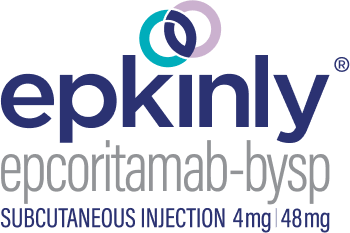Understanding the possible side effects of EPKINLY
Before deciding on any medication, it's important to understand its benefits and risks. Here are some important things to keep in mind before taking EPKINLY. If you have any concerns or questions, be sure to talk to your healthcare provider to learn more.
EPKINLY can cause serious side effects, including:
- Cytokine release syndrome (CRS), which is common during treatment with EPKINLY and can be serious or life-threatening. To help reduce your risk of CRS, you will receive EPKINLY on a step-up dosing schedule (when you receive 3 smaller step-up doses of EPKINLY before your first full dose during your first cycle of treatment), and you may also receive other medicines before and for 3 days after receiving EPKINLY. Your first full dose of EPKINLY will be given on day 22 of your first cycle of treatment. If your dose of EPKINLY is delayed for any reason, you may need to repeat the step-up dosing schedule.
- Neurologic problems that can be serious, and can be life-threatening and lead to death. Neurologic problems may happen days or weeks after you receive EPKINLY.
Tell your healthcare provider or get medical help right away if you develop a fever of 100.4°F (38°C) or higher; dizziness or lightheadedness; trouble breathing; chills; fast heartbeat; feeling anxious; headache; confusion; shaking (tremors); problems with balance and movement, such as trouble walking; trouble speaking or writing; confusion and disorientation; drowsiness, tiredness or lack of energy; muscle weakness; seizures; or memory loss. These may be symptoms of CRS or neurologic problems. If you have any symptoms that impair consciousness, do not drive or use heavy machinery or do other dangerous activities until your symptoms go away.
EPKINLY can cause other serious side effects, including:
- Infections that may lead to death. Your healthcare provider will check you for signs and symptoms of infection before and during treatment and treat you as needed if you develop an infection. You should receive medicines from your healthcare provider before you start treatment to help prevent infection. Tell your healthcare provider right away if you develop any symptoms of infection during treatment, including fever of 100.4°F (38°C) or higher, cough, chest pain, tiredness, shortness of breath, painful rash, sore throat, pain during urination, or feeling weak or generally unwell.
- Low blood cell counts, which can be serious or severe. Your healthcare provider will check your blood cell counts during treatment. EPKINLY may cause low blood cell counts, including low white blood cells (neutropenia), which can increase your risk for infection; low red blood cells (anemia), which can cause tiredness and shortness of breath; and low platelets (thrombocytopenia), which can cause bruising or bleeding problems
Your healthcare provider will monitor you for symptoms of CRS, neurologic problems, infections, and low blood cell counts during treatment with EPKINLY. Your healthcare provider may temporarily stop or completely stop treatment with EPKINLY if you develop certain side effects.
Before you receive EPKINLY, tell your healthcare provider about all your medical conditions, including if you have an infection, are pregnant or plan to become pregnant, or are breastfeeding or plan to breastfeed. If you receive EPKINLY while pregnant, it may harm your unborn baby. If you are a female who can become pregnant, your healthcare provider should do a pregnancy test before you start treatment with EPKINLY and you should use effective birth control (contraception) during treatment and for 4 months after your last dose of EPKINLY. Tell your healthcare provider if you become pregnant or think that you may be pregnant during treatment with EPKINLY. Do not breastfeed during treatment with EPKINLY and for 4 months after your last dose of EPKINLY.
The most common side effects of EPKINLY include injection site reactions, CRS, COVID-19, tiredness, upper respiratory tract infections, muscle and bone pain, rash, diarrhea, fever, cough, and headache. The most common severe abnormal laboratory test results include decreased white blood cells and decreased red blood cells.
These are not all the possible side effects of EPKINLY. Review the Important Safety Information below and the Medication Guide for EPKINLY. Talk to your healthcare provider about any concerns or for more information on possible side effects. Call your healthcare provider right away if you experience any side effects. You may report side effects to the FDA at 1-800-FDA-1088.










